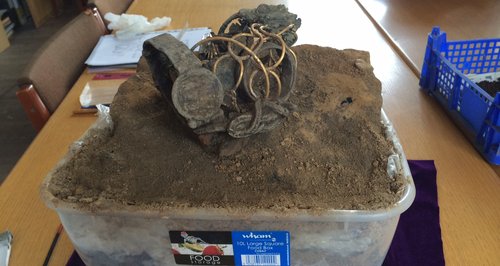Rare Roman Jewellery Hoard Found In Colchester
3 September 2014, 17:01

A hoard of Roman jewellery, thought to be the finest of its kind ever found in Britain, has been discovered in Colchester.
The items include three gold armlets, a silver chain necklace, two silver bracelets, a substantial silver armlet, a small bag of coins and a small jewellery box containing two sets of gold earrings and four gold finger rings.
They were discovered during an excavation as part of the redevelopment of the Williams and Griffin department store.
Colchester Archaeological Trust Director, Philip Crummy, said: "This discovery is of national importance. We have been working on the site for six months and this remarkable Roman jewellery collection was discovered on the third to last day of our dig.
"Our team removed the find undisturbed along with its surrounding soil, so that the individual items could be carefully uncovered and recorded under controlled conditions off-site.
"The find will be transferred to a secure laboratory, where a conservator will clean and stabilise the items and deal with the fine traces of delicate organic remains that survive, such as leather and wood."
Archaeologists say that the find is particularly poignant because of its historical context. It seems likely that the owner, or perhaps one of her slaves, buried the jewellery inside the house for safe-keeping during the early stages of Boudicca's revolt, when prospects for this important Roman town looked bleak.
Philip Crummy explains: "Boudicca and her army destroyed London and St Albans, though many of their inhabitants had time to escape. The townsfolk of Colchester were not so fortunate. They were not evacuated and endured a two-day siege before they were defeated.
"They knew a large Roman army was coming to their aid, but they were practically defenceless, with only a small force of soldiers on hand and no town defences. Imagine their panic and desperation when they learnt of the massacre of a large part of the Ninth Legion on its way to relieve them.
"It is recorded that the 'noblest' of Colchester's Roman women were taken to sacred groves, where they were killed in an horrific way. The quality of the jewellery found at Williams & Griffin suggests that the owner would have been in this category, although there is no direct evidence to indicate she ended up in a sacred grove."
Philip Crummy adds: "We also discovered food that was never eaten on the floor of the room in which the jewellery was found, including dates, figs, wheat, peas and grain. Others will almost certainly be identified when soil samples are examined by specialists.
"Foodstuffs like these do not generally survive, but in this instance they were carbonised by the heat of the fire, which perfectly preserved their shapes. Evidently, some of the food had been stored on a wooden shelf, which had collapsed on to the floor. The dates appear to have been kept on this shelf in a square wooden bowl."
Fenwick Group Trading Director, Hugo Fenwick, said: "We were pleased to fund this excavation at our Williams & Griffin store as part of its redevelopment programme. There was always a very real possibility of unearthing a significant find in the centre of Colchester, with its antiquity and stature as Britain's oldest recorded town.
"We are delighted that the archaeologists found this treasure during the very last week of their excavations, strengthening our understanding of this important Roman town and the ferocity of the Boudiccan raid."
Also included in the find were human remains, which are rare in excavations of this kind, including part of a jaw and shin bone, which appear to have been cut by a heavy, sharp implement such as a sword. These remains suggest that at least one person fought and died in the vicinity during the revolt.


